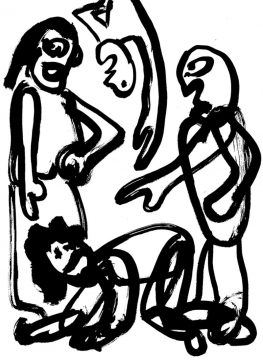Corina Copp at Bomb Magazine:
 Silliness is not such a stretch as one would think, should one think of Wittgenstein. The ludic is at play, from conception, in the language-game itself; or the duck-rabbit as a vehicle of ambiguity, a perceptual “third thing,” a visual neologism: now ears … now beak, or “Both; not side-by-side, however, but about the one via the other.” Silliness is ruminative, i.e., we must look back over time for its sense to resonate. And it seeks a beyond. I consider the question of whether the two-headed calf should be counted as one animal or two—a serious moment for the Vatican Belvedere Gardens of 1625. Three, of course. “For the physicians, the feature distinguishing the individual was the brain; for followers of Aristotle, the heart,” wrote Carlo Ginzburg. And the dissection of the animal “was done with the aim of establishing not the ‘character’ peculiar to that particular animal, but ‘the common character’ … of the species as a whole.” A parallelism: Wittgenstein’s insistence that a student learn a new word by experiencing it through practice, being responsible to it and its usage, and eventually making the word meaningful for a greater understanding of her (whole) (linguistic) (yet shared, and seen) world.
Silliness is not such a stretch as one would think, should one think of Wittgenstein. The ludic is at play, from conception, in the language-game itself; or the duck-rabbit as a vehicle of ambiguity, a perceptual “third thing,” a visual neologism: now ears … now beak, or “Both; not side-by-side, however, but about the one via the other.” Silliness is ruminative, i.e., we must look back over time for its sense to resonate. And it seeks a beyond. I consider the question of whether the two-headed calf should be counted as one animal or two—a serious moment for the Vatican Belvedere Gardens of 1625. Three, of course. “For the physicians, the feature distinguishing the individual was the brain; for followers of Aristotle, the heart,” wrote Carlo Ginzburg. And the dissection of the animal “was done with the aim of establishing not the ‘character’ peculiar to that particular animal, but ‘the common character’ … of the species as a whole.” A parallelism: Wittgenstein’s insistence that a student learn a new word by experiencing it through practice, being responsible to it and its usage, and eventually making the word meaningful for a greater understanding of her (whole) (linguistic) (yet shared, and seen) world.
more here.
